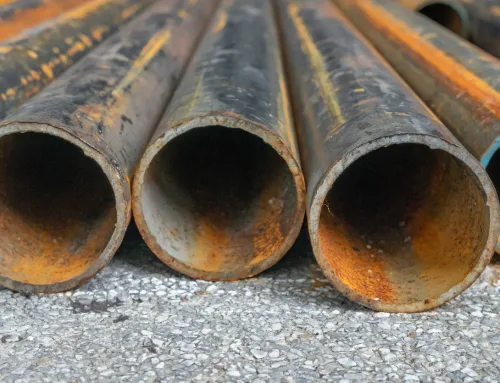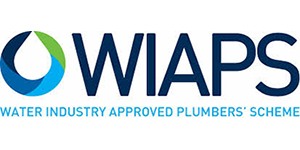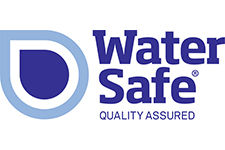Water, the elixir of life, flows freely throughout our homes and businesses thanks to a complex network of pipes hidden beneath floors and within walls. But what exactly carries this vital resource? In the UK, the materials used for water pipes vary depending on location, purpose, and even age of the property. This article delves into the most common pipe materials used in both commercial and domestic settings, exploring their advantages and disadvantages to help you understand the intricate workings behind your water supply.
Domestic Domain: Pipes for Homes
Within the familiar walls of our homes, two primary materials dominate the internal plumbing scene: copper and plastic.
Copper Pipes: A Time-Tested Tradition
Copper has been a mainstay in domestic plumbing for decades, prized for its:
- Durability: Highly resistant to corrosion and wear, copper pipes can last for well over 50 years with proper maintenance.
- Heat Resistance: Copper can handle both hot and cold water efficiently, making it a versatile choice.
- Antimicrobial Properties: Copper has inherent properties that inhibit bacterial growth within the pipes, promoting clean water flow.
- Aesthetics: Exposed copper pipes can add a touch of rustic charm to some design schemes.
However, copper also has some drawbacks:
- Cost: Copper is a more expensive material compared to plastic alternatives.
- Installation: Soldering connections require specific skills and tools, making DIY repairs challenging.
- Weight: Copper pipes are heavier than plastic, adding to installation complexity.
- Lead Concerns: While lead solder is no longer used, older homes may have copper pipes soldered with lead, posing a potential health risk.
Plastic Pipes: A Modern Marvel
Plastic pipes have emerged as a strong contender in recent years, offering several advantages:
- Cost-Effectiveness: Plastic is significantly cheaper than copper.
- Lightweight: Easier to handle and transport, simplifying installation.
- Flexibility: Bends and navigates tight spaces more readily than rigid copper pipes.
- Corrosion Resistance: Modern plastics are highly resistant to corrosion and rust.
However, plastic pipes also have limitations:
- Heat Sensitivity: Certain plastic types are not suitable for hot water applications.
- Lifespan: While durable, plastic pipes may not last as long as copper (typically around 25 years).
- Susceptibility to Damage: Plastic pipes can be more prone to punctures or accidental cuts during installation or maintenance.
Beyond Copper and Plastic:
While copper and plastic reign supreme, a few other materials are occasionally encountered in domestic plumbing:
- PEX (Cross-Linked Polyethylene): A flexible and easy-to-install plastic option gaining popularity for hot and cold water lines.
- Chlorinated Polyvinyl Chloride (CPVC): A rigid plastic often used for hot water due to its higher heat tolerance than standard PVC.
Choosing the Right Pipe for Your Home:
The ideal pipe material for your home depends on several factors:
- Budget: Copper is more expensive upfront, while plastic offers a more budget-friendly option.
- Application: Hot water lines require pipes that can withstand higher temperatures.
- DIY Skills: Soldering copper pipes requires specific skills, whereas plastic connections can be easier for DIY enthusiasts.
- Aesthetics: Exposed copper pipes can add a design element, while plastic is usually hidden behind walls.
Consulting a qualified plumber can help you choose the most suitable pipe material for your specific needs and plumbing project.
Commercial Complexities: Pipes for Businesses
Commercial buildings, with their increased water demands and often larger footprints, employ a wider range of pipe materials compared to domestic settings. Here’s a breakdown of some common choices:
Galvanised Steel: A Legacy Material
Galvanised steel, a long-standing material for commercial plumbing, offers:
- Strength and Durability: Can withstand high water pressure and handle demanding commercial applications.
- Cost-Effectiveness: A relatively affordable option compared to copper.
However, galvanised steel also has downsides:
- Corrosion: Over time, the zinc coating protecting the steel can deteriorate, leading to rust and potential water contamination.
- Weight: Steel pipes are heavy and cumbersome to install.
- Maintenance: Regular inspections and potential replacement may be necessary due to corrosion concerns.
Ductile Iron: A Reliable Workhorse
Ductile iron, a robust option commonly used for underground water mains and building risers, boasts:
- Strength and Resilience: Highly durable and can handle significant pressure and underground stresses.
- Longevity: Ductile iron pipes can last for over 100 years with proper maintenance.
- Disadvantage: Brittleness: Ductile iron, while strong, is brittle and can shatter under extreme impact.
PEX (Cross-Linked Polyethylene): A Flexible Contender
PEX, a plastic material gaining traction in commercial settings, offers several advantages:
- Versatility: Suitable for both hot and cold water lines.
- Flexibility: Easier to install around obstacles and navigate tight spaces compared to rigid metal pipes.
- Corrosion Resistance: PEX is resistant to corrosion and rust.
However, PEX also has limitations:
- Heat Resistance: While some PEX variants can handle higher temperatures, it’s crucial to choose the appropriate type for the application.
- Rodent Vulnerability: PEX can be susceptible to damage from rodents if not properly protected.
Choosing the Right Pipe for Your Business
Selecting the optimal pipe material for your commercial property requires careful consideration of several factors:
- Water Pressure Requirements: Commercial buildings often have higher water pressure demands compared to homes. Choose pipes that can handle the expected pressure.
- Application: Hot water lines necessitate pipes with adequate heat tolerance.
- Budget: Costs can vary depending on the chosen material.
- Installation Complexity: Consider factors like ease of installation and potential labor costs.
- Regulations: Commercial plumbing may have specific regulations regarding approved pipe materials. Consulting a professional plumber is vital to ensure compliance.
Conclusion: Keeping the Water Flowing
The hidden network of pipes behind our walls and beneath our floors plays a vital role in delivering clean water throughout our homes and businesses. Understanding the different pipe materials, their strengths, and weaknesses empowers you to make informed decisions for your property. Whether you’re a homeowner considering a plumbing project or a business owner overseeing building maintenance, consulting a qualified plumber is always recommended. They can assess your specific needs and recommend the most suitable pipe material to ensure a reliable and long-lasting water supply.








